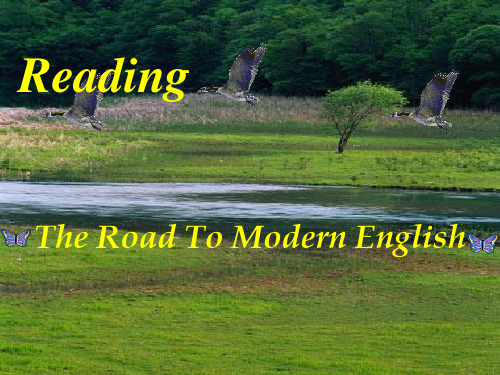河北省保定市物探中心学校第一分校高中英语必修一《Unit 2 English around the world》教案:整体阅读
- 格式:doc
- 大小:39.00 KB
- 文档页数:4


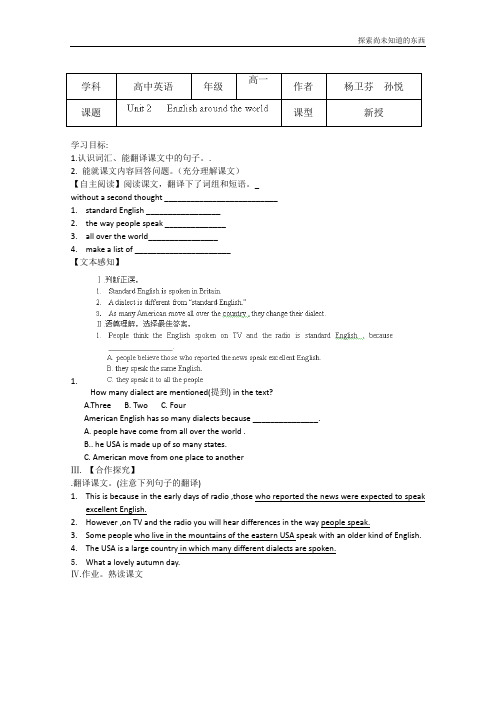
探索尚未知道的东西学科高中英语年级高一作者杨卫芬孙悦课题课型新授学习目标:1.认识词汇、能翻译课文中的句子。
.2. 能就课文内容回答问题。
(充分理解课文)【自主阅读】阅读课文,翻译下了词组和短语。
_without a second thought __________________________1.standard English _________________2.the way people speak ______________3.all over the world________________4.make a list of ______________________【文本感知】1.How many dialect are mentioned(提到) in the text?A.ThreeB. TwoC. FourAmerican English has so many dialects because _______________.A. people have come from all over the world .B.. he USA is made up of so many states.C. American move from one place to anotherⅢ. 【合作探究】.翻译课文。
(注意下列句子的翻译)1.This is because in the early days of radio ,those who reported the news were expected to speakexcellent English.2.However ,on TV and the radio you will hear differences in the way people speak.3.Some people who live in the mountains of the eastern USA speak with an older kind of English.4.The USA is a large country in which many different dialects are spoken.5.What a lovely autumn day.Ⅳ.作业。
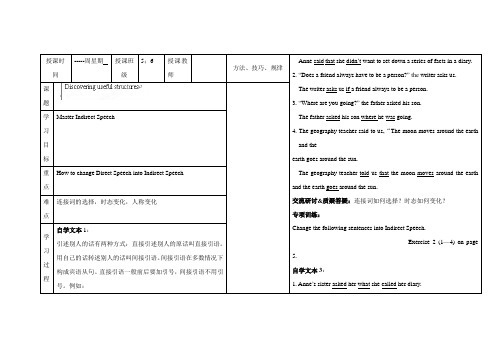
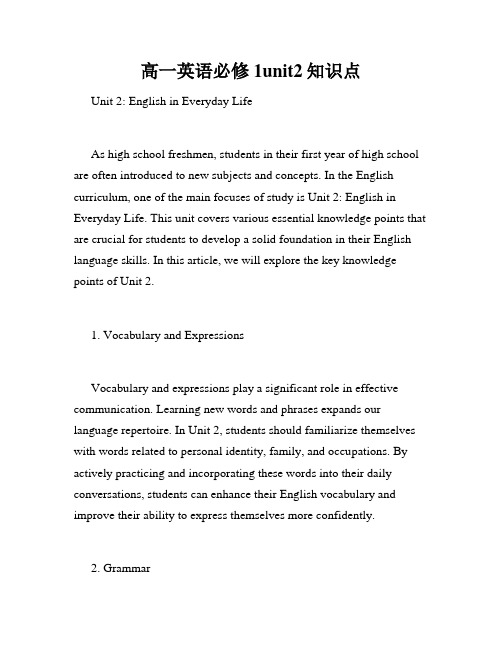
高一英语必修1unit2知识点Unit 2: English in Everyday LifeAs high school freshmen, students in their first year of high school are often introduced to new subjects and concepts. In the English curriculum, one of the main focuses of study is Unit 2: English in Everyday Life. This unit covers various essential knowledge points that are crucial for students to develop a solid foundation in their English language skills. In this article, we will explore the key knowledge points of Unit 2.1. Vocabulary and ExpressionsVocabulary and expressions play a significant role in effective communication. Learning new words and phrases expands our language repertoire. In Unit 2, students should familiarize themselves with words related to personal identity, family, and occupations. By actively practicing and incorporating these words into their daily conversations, students can enhance their English vocabulary and improve their ability to express themselves more confidently.2. GrammarGrammar forms the structural foundation of any language. In Unit 2, students will focus on various grammatical aspects, including verb tenses, sentence structures, and the correct usage of prepositions. It is important for students to grasp these grammar rules to construct grammatically correct and coherent sentences. Regular practice of grammar exercises and engaging in conversational activities will enhance students' understanding and application of English grammar.3. Reading ComprehensionUnit 2 includes a range of reading materials, such as articles, passages, and short stories. Reading comprehension exercises help students develop their reading skills, improve their understanding of the content, and enhance their overall language proficiency. Students should practice reading actively, highlighting key information, and understanding the main ideas and supporting details presented in the texts. Regular reading exercises will contribute to the development of critical thinking and analysis skills.4. Listening and SpeakingListening and speaking skills are essential for effective communication. In Unit 2, students will have opportunities to listen to audio clips, dialogues, and participate in discussions. By actively listening to different accents, intonations, and speech patterns, students can improve their listening comprehension. Engaging in class discussions and group activities will also enhance their speaking abilities, allowing them to express their thoughts and opinions fluently.5. Writing SkillsUnit 2 introduces various writing formats, such as personal narratives, descriptions, and emails. Students will learn to organize their thoughts and ideas coherently, structure their writing, and utilize appropriate vocabulary and grammar. Through constant practice and feedback, students will develop their writing skills, enabling them to effectively communicate through written English.Overall, Unit 2: English in Everyday Life is a vital part of the high school English curriculum. By mastering the knowledge points covered in this unit, students will build a solid foundation in English language skills. Regular practice, active participation in class activities, and dedicating effort to self-study are essential for the successful acquisition of these skills. Through continuous improvement andapplication, students will be well prepared for future English language challenges and effective communication in their everyday lives.。
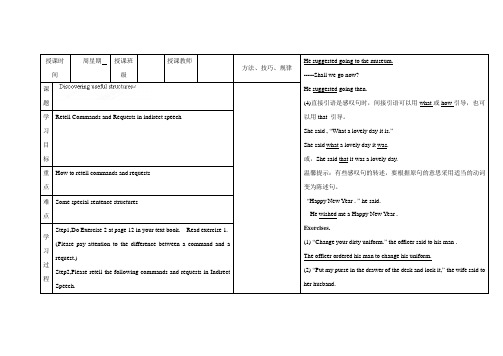
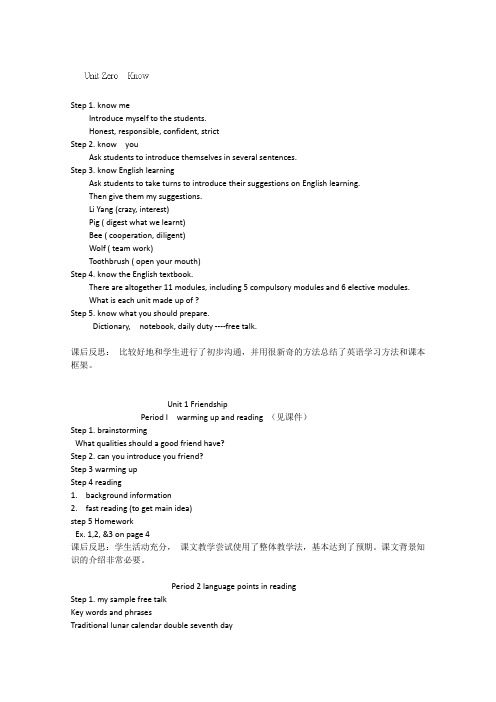
Step 1. know meIntroduce myself to the students.Honest, responsible, confident, strictStep 2. know youAsk students to introduce themselves in several sentences.Step 3. know English learningAsk students to take turns to introduce their suggestions on English learning.Then give them my suggestions.Li Yang (crazy, interest)Pig ( digest what we learnt)Bee ( cooperation, diligent)Wolf ( team work)Toothbrush ( open your mouth)Step 4. know the English textbook.There are altogether 11 modules, including 5 compulsory modules and 6 elective modules.What is each unit made up of ?Step 5. know what you should prepare.Dictionary, notebook, daily duty ----free talk.课后反思:比较好地和学生进行了初步沟通,并用很新奇的方法总结了英语学习方法和课本框架。
Unit 1 FriendshipPeriod I warming up and reading (见课件)Step 1. brainstormingWhat qualities should a good friend have?Step 2. can you introduce you friend?Step 3 warming upStep 4 reading1.background information2.fast reading (to get main idea)step 5 HomeworkEx. 1,2, &3 on page 4课后反思:学生活动充分,课文教学尝试使用了整体教学法,基本达到了预期。
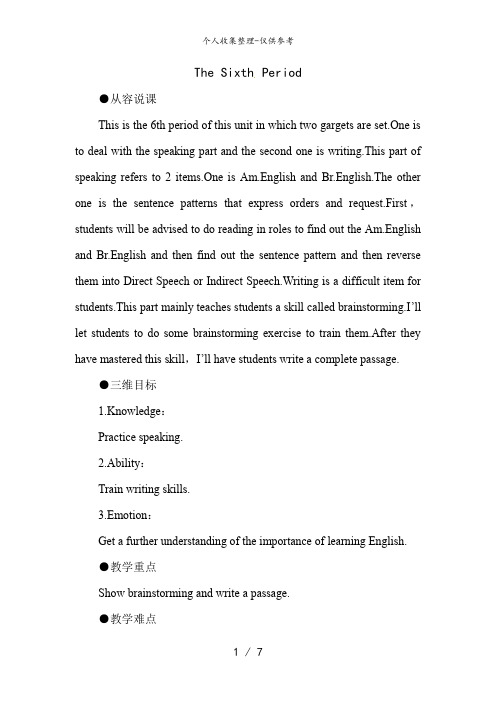
The Sixth Period●从容说课This is the 6th period of this unit in which two gargets are set.One is to deal with the speaking part and the second one is writing.This part of speaking refers to 2 items.One is Am.English and Br.English.The other one is the sentence patterns that express orders and request.First,students will be advised to do reading in roles to find out the Am.English and Br.English and then find out the sentence pattern and then reverse them into Direct Speech or Indirect Speech.Writing is a difficult item for students.This part mainly teaches students a skill called brainstorming.I’ll let students to do some brainstorming exercise to train them.After they have mastered this skill,I’ll have students write a complete passage.●三维目标1.Knowledge:Practice speaking.2.Ability:Train writing skills.3.Emotion:Get a further understanding of the importance of learning English.●教学重点Show brainstorming and write a passage.●教学难点How to improve students’writing skill.●教具准备slides●教学过程Step 1 Greetings and revisionT:<Greet the whole class as usual)Yesterday,we learnt some new words and phrases.Would you tell me your sentences that you made up using these new words?Step 2 Lead-inExcellent.In this unit “English around the World”,we learnt some knowledge of English.We’ve known that English is different even in some English-speaking countries.It’s called world English.And we’ve learnt some sentence structures which express orders and requests and the reversal of Indirect Speech and Direct Speech of these patterns.This class,we’ll use these things in practice.Step 3 SpeakingT:So now let’s see the speaking part on P15.Go through the instructions first.<after 1 minute)So it is a dialogue between Americans and Britain.So you think that they will have much difficulty in understanding each other?S:No.Though there’re some differences between Am.English and Br.English,they can understand each other.T:Yes.Let’s do reading in roles.Boys play as Amy and girls act as the lady.Pay attention to pronunciation and intonation.<students read it)T:Excellent!Have you found the different words that they use which mean the same?S:Amy uses subway and blocks while the lady use underground and streets instead.T:Well done!Then could you find out the requests and commands in direct speech in this dialogue?S:Request:Could you please tell me where the nearest subway is?Command:Go round the corner on your left-hand side,straight on and cross 2 streets.T:Could you change them into indirect speech?S:Amy asked the lady to tell her where the nearest subway was.The lady told Amy to go round the corner on her left-hand side,straight on and cross 2 streets.Step 4 WritingT:Now let’s get down to another target of this class wr iting.This is an item most students are afraid of,because when they get a subject or topic,they don’t know what to write about.Today we’ll learn to use a way,that is,brainstorming.First go through the instructions and theexample by yourselves.T:Are you sure how to do brainstorming?Now let’s first practise it on an easy topic—pollution.S:T:Good job.Now let’s turn to a more difficult topic “How can lea rning English help China in the future?First,let’s still do brainstorming.S:T:Well done!Now let’s use this skill to help ourselves write a passage.Please turn to Page 53 on the workbook.Now you should write an article on the topic “My Experience of Learning English”.First list the answers you think of to fill in the blanks.And then choose some useful information to write the article according to the settled structure.Step 5 SummaryThis class we dealt with writing skills.We can do brainstorming to help ourselves think of as many r elated items as possible on the topic.It is a very good way to write an article.Step 6 HomeworkWrite a passage on the topic “How can we improve our pronunciation”.●板书设计Unit 2 English around the worldThe Sixth Period <Writing)●活动与探究Some foreigners think that Putonghua and the Dongbei dialect are just the same.Write a passage on the comparison of Putonghua and the Dongbei dialect to show their difference to them using the way—brainstorming.Sample composition:People in different parts of China speak different dialects.Putonghua helps them understand each other.Some dialects,especially those that are spoken in the south,are so different from Putonghua that they sound like a foreign language to others who do not speak them.The differences between Putonghua and other dialects,including the Dongbei dialect,which is spoken in the northeast of China,are very small.Written Chinese,including vocabulary and grammar,is almost thesame,but there are some words in the Dongbei dialect that are not used by people who speak Putonghua.For example,Dongbei people often use “旮旯<gala)” to mean “角落<jiaoluo)” in Putonghua,and they also like using “俺们<anmen)” to refer to “我们<women)”.Listening to the Dongbei dialect,it is easy to hear small differences in intonation and pronunciation.For example,“人<ren)”is often pronounced as “yin”.However,the differences are so small that people who speak Putonghua and people who speak the Dongbei dialect can usually understand each other without difficulty.●备课资料Methods to Improve Your WritingA.Bear in mind that writing well involves other abilities than simply being able to write correct English,especially when content and organization are concerned.B.Keep in mind that your audiences are foreign users of English when considering what to write and how to express yourself.C.Note that cultural differences result in stylistic differences in English and Chinese writing.D.Try to overcome your special weakness in writing with the help of your teacher and correct them only one by one,starting from the easier ones such as spelling,punctuation and word division.E.Learn to paraphrase.F.Practice makes perfect.G.Read simplified versions of English novels and English translations of world masterpieces.H.Make good use of all kinds of dictionaries.申明:所有资料为本人收集整理,仅限个人学习使用,勿做商业用途.。
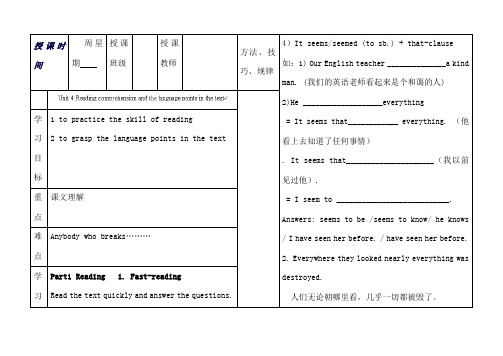
![[高中英语]必修一(Unit2 English around the world the 1st period)](https://img.taocdn.com/s1/m/8504595c4431b90d6c85c769.png)
Unit 2 English around the worldThe First Period●从容说课This is the first period of this unit.This period focuses on reading.In this lesson,there are a warming up and a passage of reading “The Road To Modern English”.This warming up attracts students’ attention to the phenomenon of world English.The reading passage tells us the present situation in which English is used and the deve lopment of English.To let students to form a good habit of reading and have proper reading strategies are one of the main tasks for senior middle school English teaching,so in this period,we should teach according to this aim.In this lesson,students will have a general idea of the conception of world English by guessing some words on American English and Britain English.To arouse students’interest,I’ll present them some typical funny stories about different kinds of English.This is to get the students ready for the reading part.Before reading the passage,students should first get familiar with the new words in the text to remove the barrier in reading.Then students are asked to guess what the text will tell us.This step is designed to train students ability to predict the content of a passage according the title.The next step is to ask students to have a general idea of the structure of the text with the purpose of improving the skill of skimming.After that,detailed reading follows.In the step,students will be asked to deal with the passage paragraph by paragraph in which they will have different tasks to finish such as true-or-false exercise,filling a form with information in the text and retelling.This step trains students’scanning skill and conclusion skill.The last step for students is to discuss the topic “It is not necessary for we Chinese to learn English since we have our own elegant language”.This is to train students to read critically.Besides,it can arouse students’ interest in learning English.●三维目标1.Knowledge:Master the words and phrases and get a view of the road to modern English.2.Ability:Train students’ reading skill.3.Emotion:Let students know more about English and inspire students to study English hard.●教学重点The understanding and comprehension of the passage.●教学难点(1)How to get to master the useful words and expressions.(2)How to improve students’ ability to read an article.●教具准备cassette recorder,some pieces of slide●教学过程Step 1 GreetingsT:Good morning,boys and girls!S:Good morning,teacher!Step 2 Warming upT:English is a widely used language.Do you know in which countries English is spoken as their native language?S a:The US,the UK,Australia,Canada...T:(a slide:Nancy:Oh,there you are.Now then,did you have a good flight?Joe:Sure,we flew all the way direct from Seattle to London.Nancy:You must be very tired.Did you sleep at all on the plane?Joe:No,not really.I’m very tired.Could I use your bathroom?Nancy:Why,of course.You don’t need to ask,just make yourself at home.Let me give you a clean towel.Joe:A towel?Nancy:Yes.Here you are.The bathroom is upstairs.It’s the second door on the left.(After a while)Nancy:Have you found it?Joe:Well,eh,yes,I mean no.I mean,I found the bathroom,but I didn’t find what I was looking for!)Here is a short dialogue.Read it and discuss with your partner:What is it that Joe can’t find in the bathroom?Why can’t he find it?S b:It is the toilet.T:And why?S c:Perhaps when Joe says “bathroom”,he means a place,where there is a toilet.But in Nancy’s eyes,it is a place where people can only have a bath.T:You are right.Do you know why there’s a misunderstanding between them?S d:Because they sp eak different kinds of English.T:Great.There’s more than one kind of English in the world.In some important ways they’re different.They’re called world English.Can you guess what they include?S e:Canadian,British,American,Australian and Indian English.T:Right.So you know even two native speakers of English may still not speak the same kind of English.Look at the examples on P9.Now try to guess which of the following words are British English and which are American English.Suggested answers:Am.English:mom;on a team;rubber;gasBr.English:mum;in a team;eraser;petrolStep 3 New WordsT:From today on,we’ll learn something about English around the world.First of all,let’s get familiar with the new words.Yesterday I asked you to read the new words and look up the meaning of them.Now let’s have a game in which one of you tells us the meaning or the explanation of the words and the others guess which word it is.Let’s go!Suggested explanation:1.include:have something or somebody as one of a group.e.g.:The tour included a visit to the Science Museum.2.play a role in:have a part in3.international:connected with two or more countries4.native:(1)connected with the place where you have always lived or have lived for a long time(2)a person who lives in a particular place,especially sb. who has lived there a long time5.elevator:lift6.flat:(1)having a smooth surface (2)(Br. E)a set of rooms for living in7.apartment:(Am. E)a set of rooms for living in8.modern:of the present time or recent timee up:to move toward10.culture:the customs and beliefs,art,way of life and social organization of a particular country or group11.actually:really;in fact12.present:(1)existing or happening now (2)being in a particular place13.rule:control14.vocabulary:all the phrases and phrases you learnage:the way in which words are used in a language16.identity:who or what sb./sth. isernment:the group of people who are responsible for controlling a country or a state18.rapidly:fastT:That’s great!You’ve made a good preparation.Now please read the words together.(show words and explanations on the slide)Step 4 Pre-readingT:Just now,we’ve known that there’re many kinds of English in the world.Then why are there so many kinds?Ss:We don’t know.T:Anyway,we’ll find out the cause today.Now read the title of the passage “the road to modern English”.What do you think it will tell us?S f:I guess it will tell us the development of English.Step 5 SkimmingT:Now let’s find out whether your answer is right.So please read the passage fast in silence and find out the main idea of each paragraph.Suggested answer:Para.1:Brief introduction of the change in English.Para.2:An example of different kinds of English.Para.3:The development of English.Para.4:English spoken in some other countries.Step 6 ScanningT:You’ve mastered the structure of the passage.Now please read para.1 and 2 loud in detail.T:(several minutes later)Have you finished?Here’re some statements of which some are right while some not.Read them and then tell whether they are true or false.If false,please find out the mistake and correct it.(slides:1.Most of the English speakers in the 16th century lived in England.2.More and more people use English as their first or 2nd language.3.The US has the largest number of English speakers.4.Native English speakers can understand everything because they speak the same kind ofEnglish.)S g:The first one is true.S h:The second one is true.S i:The third one is false.China has the largest number of English speakers.S j:The fourth one is false.Native English speakers may not be able to understand everything because they do not speak the same kind of English.T:You did a very good job.Now please read para.3 after the tape.And then fill in the form onThe Road To Modern EnglishThe cause:Cultures communicate with one anotherTime Things that happenedBetween AD 450and 1150Based on German1150 to 1500 Less like German;more like French→why?→because Frenchmen ruled England thenIn the 1600’s Shakespeare broadened the vocabulary.A big change in English,giving its own identity→why?→caused by “American Dictionary of the English language”written by Noah WebsterLater British people brought English to AustraliaT:We know culture communication brings about changes in English.Can you think of any effect that Chinese has on English?S k:In English there are some Chinese words such as gongfu,long time no see,...T:Great!With more closely communication of culture,English is changing more frequently.T:As we all know,English is spoken as the native language mostly in western countries.Then what about English in some other parts of the world?After reading the last paragraph,would you please say something about the present situation of English in your own words?S l:It is also spoken as a foreign or 2nd language in many other countries.For example,in India,it is used for government and education.In some African and Asian countries,it is also spoken,such as in South Africa,Singapore and Malaysia.While in China,the number of English speakers is increasing fast.T:Quite good.Step 7 DiscussionT:So far,we’ve known that English is becoming more and more important in China.It has been an important subject for Chinese students.But someone say that Chinese is a much more elegant language.So it is more important for us to master it and it is not so necessary for us to master a foreign language.Do you agree with this opinion and why?Suggested answer:I don’t agree with it.With the cultural communication becoming more and more frequent,the chance to contact foreigners,exported goods,international conferences,and so on,is more and more.As the most widely used language,English is regarded as the language used in most international situations.Thus,if we want to keep up with the times,we’d better master English and use it as a tool.Step 8 Summary and homeworkT:Today we’ve learned an article on “the road to modern English”.After class,you should read it again and again to get the idea of the text further.Do the exercises of comprehending andtry to tell your partner something about English in our own words.That’s all for today.Class is over.●板书设计Unit 2 English around the worldThe First PeriodNew words:Main idea of each para-graph:... ...... ...●活动与探究This activity is to make research into differences between different kinds of world English and some words from other languages in English.Differences Pronunciation Spelling MeaningUsage...Words from other languages Chinese Japanese French Spanish German...●备课资料Soon There Will Be No Such Thing As “Wrong”English In this article:Senior Indian journalist Gautaman Bhaskaran says that English is so flexible that one day there will be too many variations around the world.English is a victim of its own success.The other day The Times in London displayed a cartoon showing an excited schoolboy flaunting his test scores:“I done good in English.”Days later,editors of the Oxford Dictionary of English rued the spread of what they termed “greengrocer’s English”.Grammar and syntax,they regretted,were going out of fashion.Others in England—in the Oxf ord University Press,the BBC and so on—said the incorrect use of cliches were marring the smooth flow of a great language whose ability to imbibe and absorb has been one important reason for its success.This success also stems from the language’s unique position of being the only one spoken in most parts of the world.Really,English has no boundaries.Even in countries such as Japan and China,which were not colonized by Britain,English is making a determined “conquest”.Unfortunately,such a conquest is not always welcome because a language sometimes doubles as a political weapon.At some point it ceases to be just a means of communication and English is a classic example of this.It has always led a troubled life.It has been disliked,even hated,largely because the people who originally spoke English conquered,colonized and terrorized half the world,or just about.The animosity to the language continues,at least in some places.The bitterness that the French,for instance,have for English is a g ood example of a languagebeing giving a quasi-political role in society.Fortunately,this aversion does not run as it did some years ago,and there is a growing realization that English is the lingua franca.China and Japan,among a host of other nations,have been making serious efforts to promote the language.Some months ago there was a hue and cry in Singapore over the spread of “terrible English”which the authorities called “Singlish”.“Down with it!”they said,and urged Singaporeans to learn correct English,the phenomenal flexibility of which has often made things difficult for those who have to use it every day.Today even university graduates find it hard to pen a couple of correct sentences in it.More horrifying is that many teachers and university vice-chancellors speak and write poor and ungrammatical English.Often,they are found to be out of touch with what is called “usage”and,as we all know,this is one of the pillars the language rests on.Yet,despite the mess that English is in India,the nation has—more than two centuries after Samuel Johnson wrote his English dictionary—become the hottest destination for top lexicographers.The new 10th revised edition of the Oxford Concise English Dictionary includes hundreds of Indian words.Leading the list of 600 Indian English entries are “Hindutva”(Hindu identity),“dada”(older brother),“panchayat”(local administration),“chai”(tea),“pani”(water),“puri”(a dish made of wheat)and “dosa”(rice pancake).In fact,Indian words from 20 per cent of entries and rank as the third-largest component after American and Australian English segments.Other former British colonies such as New Zealand,South Africa and the Caribbean islands follow the Indian English collection of words.English,despite its hiccups,is endearing to the common Indian man or woman.About 150 years after Lord Macaulay introduced the language in India to create “babus”(clerks)for the British bureaucracy,70 million Indians speak English,a number that is higher than that in Britain.However,there is a sneaking fear among Puritans that with this kind of sp read,English may stop being English.While the French have fanatically preserved the purity of their language,the English have liberally allowed other influences to affect their lingo.So,what is seen as its strength —the fact that people all over the world understand it—can be an undermining obstacle.There might be a serious problem if every state or continent were to have its own version of English.As one writer said:“There is a risk in relentless atomization.”With too many variations of the language,a time may come when one group of English-speaking people may not be able to understand another.This is happening.Hear the way Singaporeans speak English.Listen to the Australians pronouncing “e”;it sounds like “a”.A few of the films made lately by British directors Ken Loach and Mike Leigh had to have subtitles in English.Accents in the north of Britain can be hard for people in the south to understand,let alone those outside the island.The point is,no language must be allowed such flexibility—anything goes in the name of functional communication—that people begin to take liberties with it.Ultimately,there may be no such thing as wrong English.The schoolboy in the Times cartoon was doing just that.He knew nobody would scold him for getting his English wrong.不久以后就没有“错误的”英语这一说了英语成了自身成功的牺牲品,前几天,伦敦的《泰晤士报》刊登了一幅漫画,上面画了一个兴高采烈的男学生炫耀他的考试成绩:“I done good in English”(我的英语成绩不错). 几天后,《牛津英语词典》的编辑们对他们所定义的“菜贩子讲的英语”的传播大为悲叹. 他们感到遗憾的是, 语法和句法都过时了.其他一些在英国——牛津大学出版社、BBC(英国广播公司)等的人说:不正确地使用陈腐辞藻损害着一种伟大语言的流畅性,英语博采众长的能力是其成功的一个重要原因.英语的成功同样源自其独特的地位,它是在世界的大多数地区都使用的惟一一门语言.的确,英语没有国界.甚至在没有被英国所殖民过的国家,诸如中国和日本,英语正进行着决定性的“征服”.不幸的是, 这种征服不总是受到欢迎,因为一种语言有时会被兼作政治武器.有时候,语言不再仅仅是一种沟通的工具,而英语又是这种情况的一个经典范例.英语总是摆脱不掉困扰.它曾不受人喜欢,甚至遭人厌恶过.主要是因为最初讲英语的人征服、殖民和胁迫了世界的一半地区,或者说将近一半地区. 对英语的敌意还在持续着,至少在某些地方仍是这样.语言在社会中被赋予了一种准政治的作用,比如法国人对英语的嫉恨就是一个很好的例子.幸运的是,这种对英语的厌恶不像多年前那么严重,人们越来越认识到英语其实是一种混合语.在众多国家,比如中国和日本,一直在大力推广英语的使用.几个月前在新加坡,人们大声抗议被当局称作“新加坡式英语”的“可怕的英语”正在到处传播.“够了!”他们说道,并督促新加坡人学习正确的英语.对于那些每天都必须使用英语的人来说, 英语异常的灵活性经常把事情搞得很困难.现在,即使是大学毕业生都会发现写几句正确的英文句子很难.更可怕的是, 许多教师和大学副校长说着和写着糟糕的不合语法的英语.人们经常会发现这些人不注重语言的“用法”,正如我们都知道的,用法是语言的支柱之一.然而,尽管英语在印度被搞得一团糟,在塞谬尔·约翰逊编写了他的英语字典两个多世纪以后, 这个国家已经成为顶级词典编纂者们最热门的词汇来源地.《牛津简明英语词典》新近出版的第十修订版收录了几百个印度词汇.在600条印度英语词条中最重要的词汇是“Hindutva”(印度身份),“dada”(长兄),“panchayat”(地方行政机关),“chai”(茶),“pani”(水),“puri”(用小麦做的食品),以及“dosa”(烤米饼).实际上,印度词汇构成了20%的词条并且在美国和澳大利亚英语条目之后,成为第三大词典词汇组成部分.从其他前英国殖民地,比如新西兰、南非和加勒比海群岛所收录的词汇都位居印度英语之后.普通的印度人都还是喜欢英语的,尽管有时会有些小问题.麦考利勋爵将英语引入到印度并为英国官僚机构创造了像“babus”(职员)这样的词汇,150年之后,有7000万的印度人在讲英语,人数比在英国讲英语的人都要多.然而,清教徒却普遍心存恐惧,怕如此下去英语会变得面目全非了.与法国人狂热地保护法语纯洁性的做法不同,英国人很大方地接受了外界对其影响.结果是,世界各地的人都懂英语——可以说这一优势削弱了英语的纯洁性.如果每个国家或大陆都有其版本的英语的话,那么问题可能就严重了.正如一位作家所说的:“无休止使英语分化是危险的.”英语如果有太多的变种的话,会出现这样的情况:当一群讲英语的人可能听不懂另一群人所讲的英语.这种情况事实上正在发生.您来听听新加坡人说的英语.听澳大利亚人发“e”这个音的;听起来就像发“a”这个音.最近由英国导演肯·露弛和麦克·雷导演的几部电影中不得不加上了英语字幕,因为英国北部人的口音让英国南方的人很难听懂,更不用说英国以外的人了.问题的关键是,没有什么语言可以允许有如此的灵活性——以至于人们借实际沟通之名,就可以随意使用了.最终的结果是:可能不会有错误的英语这回事了.在《泰晤士报》卡通中的男学生正是这么做的.因为他清楚没有人会指责他所讲的英语不正确.。
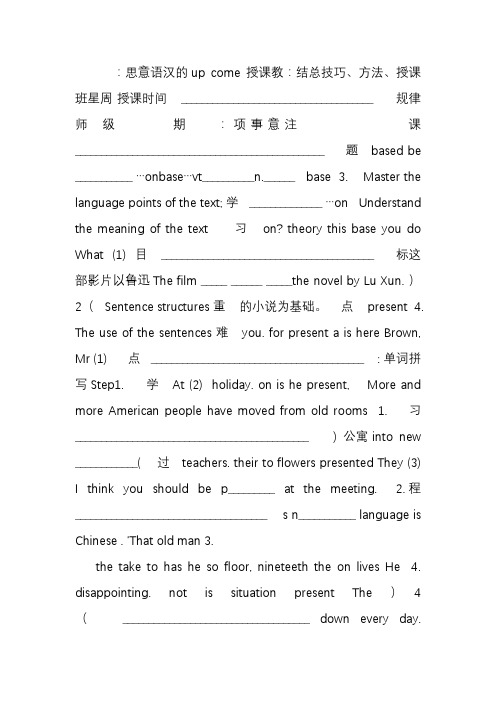
:思意语汉的up come 授课教:结总技巧、方法、授课班星周授课时间 _____________________________________ 规律师级期:项事意注课________________________________________________ 题based be ___________ …onbase…vt__________n.______ base 3. Master the language points of the text; 学______________ …on Understand the meaning of the text 习 on? theory this base you do What (1) 目 _________________________________________ 标这部影片以鲁迅The film _____ ______ _____the novel by Lu Xun. )2(Sentence structures 重的小说为基础。
点present 4. The use of the sentences 难 you. for present a is here Brown, Mr (1) 点_________________________________________ : 单词拼写Step1. 学 At (2) holiday. on is he present, More and more American people have moved from old rooms 1. 习_____________________________________________ ) 公寓into new ____________( 过 teachers. their to flowers presented They (3) I think you should be p_________ at the meeting. 2.程_____________________________________ s n___________ language is Chinese . ’That old man 3.the take to has he so floor, nineteeth the on lives He 4. disappointing. not is situation present The )4(____________________________________ down every day.e__________up and me. for all are meeting the at present people The (5) ) by myself. 航行the _________ ( t want to make ’I don 5. _________________________________ ) 正式的four-day_________(a for leaving was president The 6. visit to Mexico. :意注_________ adj._______; n._______ :结总_________________________________ go will I thinkt ’Idonthoughts, second ),on 事实上________( 7. sb him. to sth present ___________ at present be vt.____________ out with _______________ doing v___________by his build to him advised teacher The 8. more reading. )flowersof bunch a (花鲜束送一她给他(1) 译翻She speaks f________though not very correct French __________________________________ 9.意满很作工的前目对他(2)is with) satisfied (be woman the of ) 身份____________(the that said is It 10.still __________________________________ unclear of use make 5. )takes a walk in the morning . 时常He ___________( 11.我们必须利(1) We must _________________________________to study. part of (后半的)Celebrations are planned for the ___________ 12. November. 用每一分钟学习。

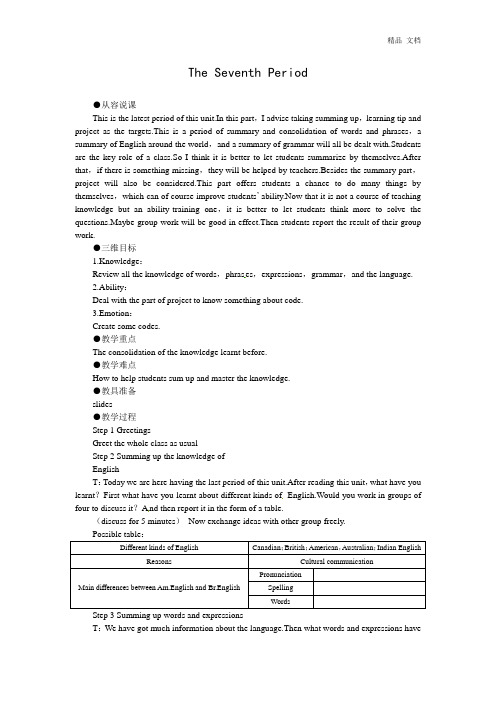
The Seventh Period●从容说课This is the latest period of this unit.In this part,I advise taking summing up,learning tip and project as the targets.This is a period of summary and consolidation of words and phrases,a summary of English around the world,and a summary of grammar will all be dealt with.Students are the key role of a class.So I think it is better to let students summarize by themselves.After that,if there is something missing,they will be helped by teachers.Besides the summary part,project will also be considered.This part offers students a chance to do many things by themselves,which can of course improve students’ ability.Now that it is not a course of teaching knowledge but an ability-training one,it is better to let students think more to solve the questions.Maybe group work will be good in effect.Then students report the result of their group work.●三维目标1.Knowledge:Review all the knowledge of words,phras es,expressions,grammar,and the language.2.Ability:Deal with the part of project to know something about code.3.Emotion:Create some codes.●教学重点The consolidation of the knowledge learnt before.●教学难点How to help students sum up and master the knowledge.●教具准备slides●教学过程Step 1 GreetingsGreet the whole class as usualStep 2 Summing up the knowledge ofEnglishT:Today we are here having the last period of this unit.After reading this unit,what have you learnt?First what have you learnt about different kinds of English.Would you work in groups of four to discuss it?A nd then report it in the form of a table.(discuss for 5 minutes)Now exchange ideas with other group freely.Different kinds of English Canadian;British;American,Australian;Indian English Reasons Cultural communicationMain differences between Am.English and Br.English Pronunciation SpellingWordsStep 3 Summing up words and expressionsT:We have got much information about the language.Then what words and expressions havewe learnt?Discuss with your partner and make a list.S:Noun:role,native,culture,vocabulary,usage,identity,government,phrase,command,request,standard,accentVerb:include,rule,command,request,retell,recognizeOther expressions:play a role (in);because of;come up;be present at;such as;be polite to Then please use the right forms of the words or phrases to fill in the blanks:1.The famous actor said he looked forward to ____________ in the movies directed by talented Zhang Yimou.2.The sports meet was put off ____________ the bad weather.3.After reading the text,we were told to ____________ the passage using our own words.4.He changed so much that I didn’t ____________ him at first.5.More than half of the people who were invited ____________ the meeting.6.In this vacation,I plan to do many things ____________ traveling to Hong Kong.7.Nobody dared to go against his ____________ that everyone (should)leave until 8 o’clock.8.The problem ____________ at the meeting has been solved.Suggested answers:1.playing a role2.because of3.retell4.recognize5.were present at6.includingmand ing upT:A good summary.Then would you please fill in the blanks with correct forms of words.Step 4 Summing up grammarIn this unit,we met across a new grammar item:request and command.Now recall the sentence patterns with your partner.Command:Do/Do not do...Request:Do/Do not do...please.Can you do...?Could you do...?Will you do...?Would you do...?Step 5 Learning tipsT:We know interest in the mother of success.If you find that the thing that you are doing is not so interesting,it’s not so likely that you will succeed.It is the same case with the study of English.So when you learn English,you’d better try to find fun in the study.For example,try to make jokes using words which have different meanings.For example:①Don’t rock that baby on the rock while playing that rock music.②I wish to wish the wish you wish to wish,but if you wish the wish the witch wishes,I won’t wish the wish you wish to wish.③If white chalk chalks white on a black blackboard,will black chalk chalks black on a white whiteboard then?Will you find out more funny things in studying English?Some slang in America:Beats Me 林先生刚到美国时,经常不经意间听到“Beats me”这句话,心想总不会叫人揍自己吧!例如,有人问:“When is this rain supposed to stop?”对方可能回答“Beats me !”若再问:“Where are your parents?”,对方回答也可能是“Beats me!”这句话如此管用,几乎适用于任何场合,那么到底是什么意思呢?林先生求教于人,得知其意是“I don’t know”——我不知道,我无法回答。

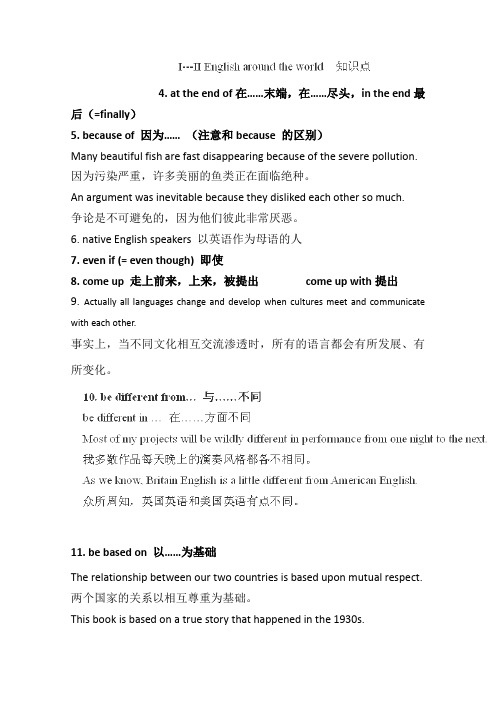
4. at the end of在……末端,在……尽头,in the end最后(=finally)5. because of 因为…… (注意和because 的区别)Many beautiful fish are fast disappearing because of the severe pollution. 因为污染严重,许多美丽的鱼类正在面临绝种。
An argument was inevitable because they disliked each other so much.争论是不可避免的,因为他们彼此非常厌恶。
6. native English speakers 以英语作为母语的人7. even if (= even though) 即使8. come up 走上前来,上来,被提出come up with提出9. Actually all languages change and develop when cultures meet and communicate with each other.事实上,当不同文化相互交流渗透时,所有的语言都会有所发展、有所变化。
11. be based on 以……为基础The relationship between our two countries is based upon mutual respect. 两个国家的关系以相互尊重为基础。
This book is based on a true story that happened in the 1930s.这本书以发生在20世纪三十年代的真实故事为基础。
The reporter asked the writer who he based his character on.记者问作家他作品的人物是以谁为原型的。
12. at present 目前,眼下be present at 在席;出席13. make ( good/full)use ofWe have a lot of work to do, so we have to make good use of time.我们有很多工作要做,所以要好好利用时间。
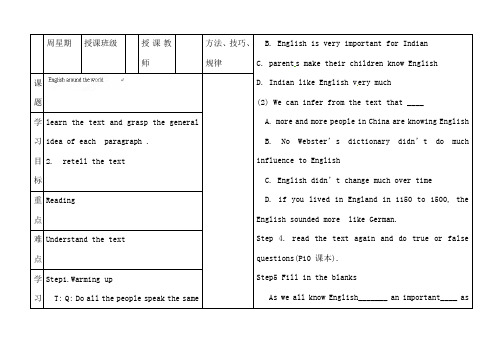

一. 教学内容:必修1:Unit 2 English around the world二. 教学重点:1. 重点词汇2. 重点短语3. 重点句型三. 知识精讲:〔一〕重点词汇1. base1) v. One should always base his opinion on facts.be based on/uponThe film is based on a novel by Lao She.2) n. We camped at the base of the mountain.ABCD is the base of the pyramid.Our pany’s base is in Beijing.2. recognizeThey recognized this man without difficulty.They don’t recognize the new government.be recognized as 被承认为recognize sb. to be 承认某人是……[典型例题]①—Oh, it’s you! I ______ ________ you. --—I’ve just had my hair cut, and I’m wearing new glasses.②Though they hadn’t met for many years,they ______ each other at first sight.③Lincoln is recognized ____ one of the greatest presidents in America.3. mandmand sb. to do sth. 命令〔要求〕某人做某事have a good mand of … 对……精通mand that … (should) + 动词原形[典型例题]He manded that all the gates __________.A. should shutB. would be shutC. shutD. be shut4. request用作名词,意为“请求〞,是可数名词。
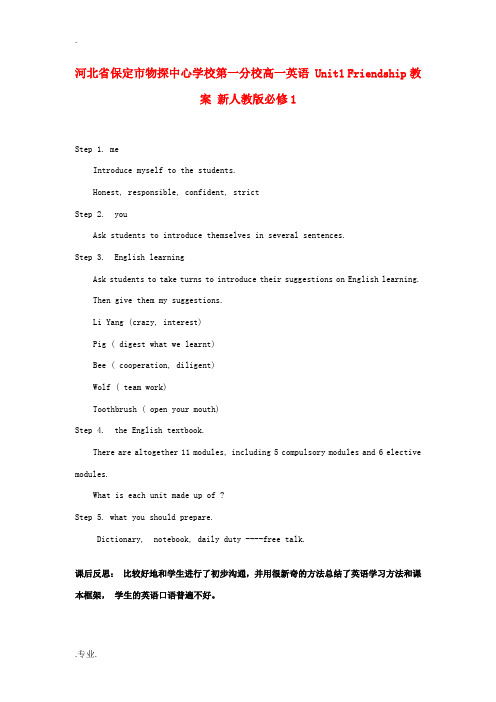
河北省保定市物探中心学校第一分校高一英语 Unit1 Friendship教案新人教版必修1Step 1. meIntroduce myself to the students.Honest, responsible, confident, strictStep 2. youAsk students to introduce themselves in several sentences.Step 3. English learningAsk students to take turns to introduce their suggestions on English learning.Then give them my suggestions.Li Yang (crazy, interest)Pig ( digest what we learnt)Bee ( cooperation, diligent)Wolf ( team work)Toothbrush ( open your mouth)Step 4. the English textbook.There are altogether 11 modules, including 5 compulsory modules and 6 elective modules.What is each unit made up of ?Step 5. what you should prepare.Dictionary, notebook, daily duty ----free talk.课后反思:比较好地和学生进行了初步沟通,并用很新奇的方法总结了英语学习方法和课本框架,学生的英语口语普遍不好。
Unit 1 FriendshipLead-inEveryone has his friends, and so do you. Are you good to your friends? Do the following survey. (text book page 1)Maybe your friends are Xiao Wang, Xiao Zhang or anyone else. But does a friend always have to be a person? What else can be your friend? Now let’s look at what Anne’s best friend is.Fast-readingRead the passage silently, and find out the answers to the following questions.1. Who was Anne’s best friend? ( her dairy kitty)2. How long die Anne and her family hide away before they were discovered?( nearly twenty-five months)Careful-readingRead the passage again and do exercise 1 on page 3.Answer the first question in exercise 2. (about 23 months)Read the passage again:Read the passage again and do exercise 3 on page 2.Practise:Fill in the blanks:I often feel upset and ignore anyone else. My friends are concerned about me. Once they have time, they come to tell me to calm down. I think it’s because I haven’t been able to be outdoors for long. So one day I suddenly grew crazy about everything to do with nature. For example, I stayed awake on purpose until half past eleven one evening in order to have a good look at the moon. Another time five months ago, the dark, rainy evening, the wind, the thundering clouds held me entirely in their power.I set down what happened to me in a diary.1 Survey add add up outdoors upset ignore calmcalm down have got to concern be concerned about2 Calm1〕.The sea was calm.2〕.We must be calm before danger.3〕.The mother calmed her children.Calm: 指风浪或人的心情不激动Quiet: (环境〕安静的,无动静的Silent: 寂静的,沉默不语的Still: 静止的,不动的,没有动作和运动用quiet, silent, still 和calm填空1.When you hear the sad news, please keep _____.2.Please keep ______ when I take a photo of you.3.The Sweden stood _______ except that his lips moved slightly.4.In a ____ cinema, they are watching a ____ film.3 power1〕. He was so shocked by what happened to hisparents that he lost the power of speech.2〕. I can't give you a refund - I'm afraid it's notwithin my power.3〕. Our building lost power during the storm.4〕. Many people are opposed to the use ofnuclear power.5〕. America is considered to be one of thepowers of the world.4. 词组:1.合计2.使平静下来,使镇定下来3.不得不,必须4. 关心,挂念add up Calm down Have got to Be concerned about综合练习:A Put the words in the following sentences:series outdoors thunder entirely power curtain dusty 1. There's been a whole _______ of accidentson this road.2. Although Tim and Mike come from ______different backgrounds, they became closefriends.3. He is fascinated by the ______ of music.4. The storm brought strong winds, ________and lightning.5. “How can Linda recover from her illness inthis room when it’s so dirty and ______? Itwill only make her worse,〞 said the doctor.6. Please draw the _________; the sunlight istoo bright.7. It's warm enough to eat _________ tonight.B Complete the following sentences with the right expression:set down, go through, on purpose, in order to, at dusk, face to face1. I have heard of him before, but I’ve nevermet him _________.2. —Sorry, I didn’t break the plate __________.—It’s OK. Don’t worry about it. It happens, doesn’t it?3. Born in a poor family, the manager_________ lots of hardships in his childhood.4. After Peter died, George __________ thestory of their friendship in a book.5. When the man saw the car accident on thehighway, he stopped___________ offer help.6. When the street lights go on _______, theymake a beautiful picture, so different from thedaytime.课后反思:学生对本单元话题很感兴趣,能积极配合,上课气氛活跃,但基础较差,单词量很小,基本单词很多不熟悉,而且学习习惯很差,不会做笔记,听课效果差,课堂有些乱。
